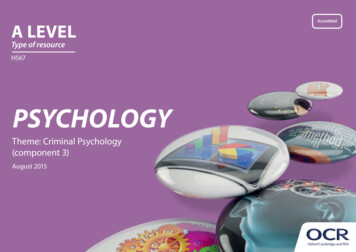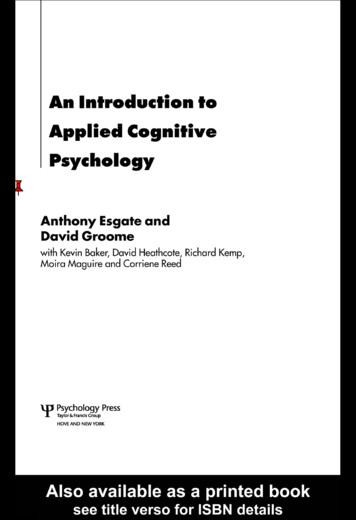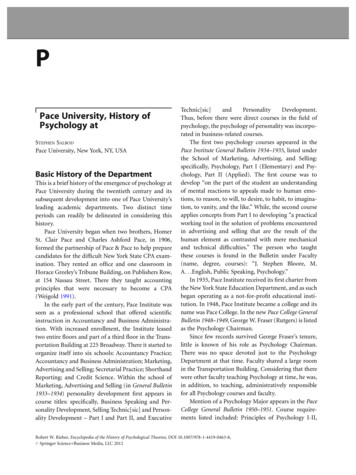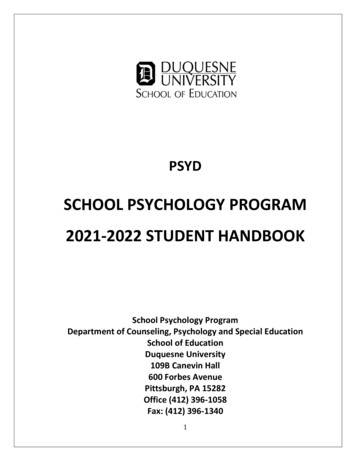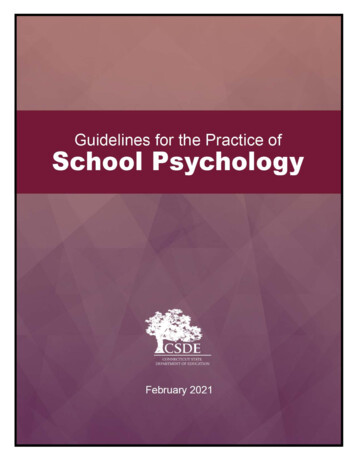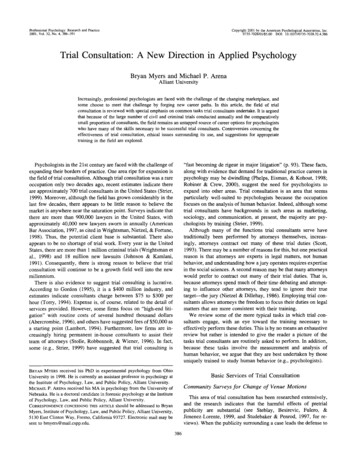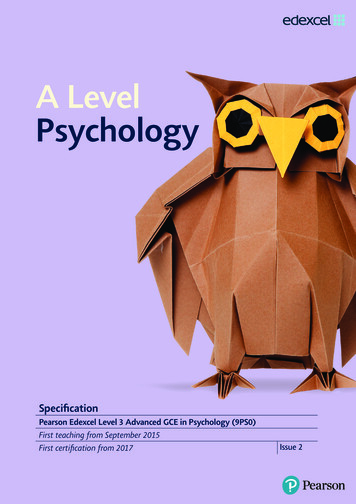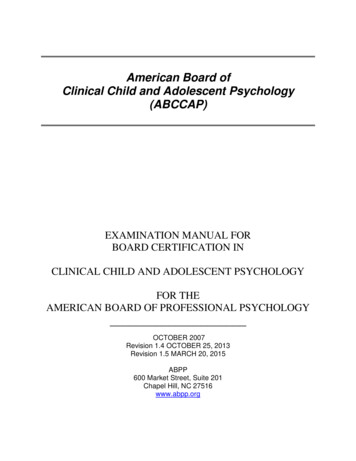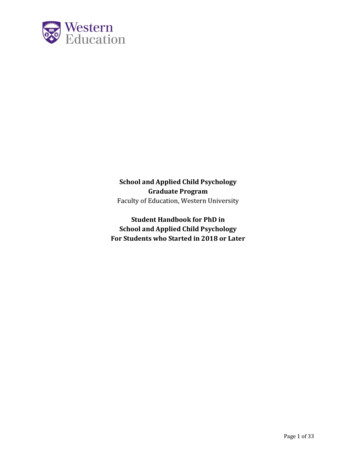
Transcription
School and Applied Child PsychologyGraduate ProgramFaculty of Education, Western UniversityStudent Handbook for PhD inSchool and Applied Child PsychologyFor Students who Started in 2018 or LaterPage 1 of 33
Table of ContentsIntroduction . 5Mission:. 5Training Model: . 5What Do School Psychologists Do?. 6Admission Requirements . 7CPA Accreditation . 7Core Faculty Members . 8Karen Bax, Ph.D. C. Psych. (Assistant Professor) . 8Jason Brown, Ph.D. (Professor) . 8Claire Crooks, Ph.D. (Professor) . 8Emma Deurden, PhD (Assistant Professor) . 8Alan Edmunds, Ph.D. (Associate Professor) . 9Deanna Friesen, PhD (Assistant Professor). 9Peter Jaffe, Ph.D. (Professor) . 9Colin King, Ph.D. (Associate Professor) . 9Perry Klein, Ph.D. (Professor) . 9Gabrielle Lee, Ph.D. (Assistant Professor) . 9Nicole Neil, PhD., BCBA-D (Assistant Professor) . 10Elizabeth Nowicki, Ph.D. (Associate Professor) . 10Susan Rodger, Ph.D. (Associate Professor) . 10Jacqueline Specht, Ph.D. (Professor) . 10Shannon L. Stewart, Ph.D. (Professor) . 10Thesis Supervision. 11Applied Setting for Research and Practica . 11Mary J. Wright Centre . 11Child and Youth Development Clinic (CYDC) . 12MA/PhD in Education Studies in the Field of School and Applied Child Psychology (SACP)13Course Sequence for MA Program . 13Fall of Year 1. 13Winter of Year 1 . 14Fall of Year 2. 14Winter of Year 2 . 14Course Sequence for PhD Program . 14Fall of Year 1. 14Winter of Year 1 . 14Summer of Year 1 . 14Fall of Year 2. 15Winter of Year 2 . 15Summer of Year 2 . 15Page 2 of 33
Fall of Year 3. 15Winter of Year 3 . 15Summer of Year 3 . 15Fall, Winter and Summer of Year 4 . 15Course Requirements Prior to Graduation . 18Timeline of Program . 18Forms . 18Course Descriptions . 18Doctoral Thesis . 18Thesis Proposal and Presentation. 18Ethics. 19Data Collection . 19Western University’s Thesis Guidelines . 19Thesis Examination . 20Qualifying Examination . 20Timelines for Completion of Forms . 20Practicum Placements . 20Requirements of Practicum . 22Site Selection and Application . 22Supervision . 23Practicum Evaluation . 23Remedial Practicum . 24Program Sanctioned Hours . 24Submission of Hours Log. 25Vulnerable Persons Police Record Checks . 25Up to Date Vaccinations . 25Professional Insurance. 25Legislation . 26Full Year Internship . 26Application Process . 26Schedule and Time Requirements . 27Supervision . 27Internship Evaluation . 27Financial Assistance . 28Funding . 28Research and Teaching Assistantships . 28Research Assistant (RA) . 29Page 3 of 33
Graduate Research Assistant (GRA) . 29Teaching Assistant (TA) . 29Graduate Student Assistant (GSAA) . 29External Grants and Fellowships . 29Ontario Graduate Scholarship . 30Tri-Agency Awards (CIHR, SSHRC & NSERC) . 30Additional Scholarships . 30Academic Progress and Student Evaluations . 30Classroom Performance . 30Annual Report of Student Progress . 31Student Portfolio . 31Criteria for Maintaining Satisfactory Progress . 31Student Advisory Committee . 32Test Library . 32Page 4 of 33
IntroductionOn behalf of the entire School and Applied Child Psychology faculty, we would like towelcome all new students. The School and Applied Child Psychology program started in2015 and was designed to be CPA accredited. Application for accreditation for the Schooland Applied Child Psychology will be made shortly after graduation of the initial cohort(s).This handbook was designed to provide new and current students with a wealth ofvaluable knowledge needed to successfully complete this program. Students are advised tobecome familiar with program requirements, policies and procedures to ensure aproductive experience with the School and Applied Child Psychology Program.Mission:Our mission is to prepare school psychologists to create and use the knowledge ofpsychological science in ways that enhance the well-being of children, youth and families inschools and communities. Our graduates have a deep interdisciplinary psychologicalunderstanding of the nature of cognition, learning and teaching and the factors andconditions that influence the learning process and its outcomes. Our graduates have theknowledge, clinical skills, and competencies to apply these understandings to informassessment and intervention practice within school, mental health agencies and othersettings.Training Model:Our foremost commitment is to provide a model of training that embraces thescientist-practitioner approach, a model that places primary emphasis on blending theroles of clinician and researcher into one entity. We seek to nurture graduates who:1) Have the knowledge, skills, competencies and attitudes that encourage a scientificapproach towards research and practice;2) Move psychological research and professional fields forward by generating newknowledge that contributes to the development of scientific literature and thefurther development of professional practice across all psychological domains.3) Are active consumers of relevant research findings and apply the findings andmethods of psychological research to educational and clinical problems andadvancing practice.4) Have the necessary research sophistication to incorporate high-quality research inschool and clinical settings.Scientist: Scientific knowledge and research underpin all aspects of our program.Students acquire in-depth knowledge of research and theory related to diverse areas ofpsychology in general and school psychology in particular. They are introduced to thescientific and theoretical literature in the biological cognitive-affective, and social bases ofPage 5 of 33
behaviour, individual behaviour, psychological assessment, intervention, learning andinstruction, and system organization. Moreover, our students are prepared to becompetent researchers who have knowledge and skills in the critical evaluation ofresearch, research design, diverse analytical and methodological approaches (for example,quantitative, qualitative, mixed methods, indigenous methodologies), and dissemination offindings. This knowledge base permits them to be critical consumers of research and touse their acquired knowledge to inform school psychology and clinical practice.Practitioner: We prepare practitioners who embody the notion that science mustinform practice with demonstrated abilities to identify, utilize and implement evidencebased practices in assessment, intervention and prevention. Our students acquire a strongresearch and theoretical foundation in core content areas that they systematically applythrough problem-solving to diverse problems of practice. We are also committed topreparing students who actively engage in the ethical decision-making process, have thecompetencies to navigate diverse interpersonal relationships, maintain a positive workingalliance with the students/clients, and collaborate effectively with others in planning anddecision-making.What Do School Psychologists Do?Through a combination of assessment, direct intervention, consultation andcollaboration, school psychologists work to: Improve academic achievement and student well-being Promote positive behaviour and mental health Support diverse learners Create safe, positive school climates Strengthen family-school partnerships Improve school-wide assessment and accountabilityAlthough most school psychologists work in K-12 schools, some are employed in othercommunity, academic, and medical settings. Our program integrates the NationalAssociation of School Psychologists (NASP) domains of practice.National Association of School Psychology: 10 Domains of PracticeDomain 1: Data-based, DecisionMaking and AccountabilityDomain 2: Consultation andCollaborationSchool psychologists have knowledge of varied models and methods ofassessment and data collection for identifying strengths and needs,developing effective services and programs, and measuring progressand outcomes.School Psychologists have knowledge of varied models and strategies ofconsultation, collaboration, and communication applicable toindividuals, families, groups, and systems and methods to promoteeffective implementation of services.Page 6 of 33
Student-Level ServiceDomain 3: Interventions andInstructional Support toDevelop Academic SkillsDomain 4: Interventions andMental Health Services toDevelop Social and Life SkillsSchool psychologists have knowledge of biological, cultural, and socialinfluences on academic skills; human learning, cognitive, anddevelopmental processes; and evidence-based curricula andinstructional strategies.School psychologists have knowledge of biological, cultural,developmental, and social influences on behavior and mental health,behavioural and emotional impacts on learning and life skills, andevidence-based strategies to promote social-emotional functioning andmental health.Service-Level ServiceDomain 5: School wide practiceto support learningDomain 6: Preventive andResponsive ServicesDomain 7: Family-SchoolCollaboration ServicesSchool psychologists have knowledge of school and systems structure,organization, and theory; general and special education; technologyresources; and evidence-based school practices that promote learningand mental health.School psychologists have knowledge of principles and research relatedto resilience and risk factors in learning and mental health, service inschools and communities to support multi-tiered prevention andevidence-based strategies for effective crisis response.School psychologists have knowledge and principles and researchrelated to family systems, strengths, needs, and culture; evidence-basedstrategies to support family influences on children’s learning andmental health; and strategies to develop collaboration between familiesand schools.Foundations of School Psychological Service DeliveryDomain 8: Diversity inDevelopment and LearningDomain 9: Research andProgram EvaluationDomain 10: Legal, Ethical, andProfessional PracticeSchool psychologists have knowledge of individual differences, abilities,disabilities, and other diverse student characteristics; principles andresearch related to diversity factors for children, families, and schools,including factors related to culture, context, and individual and roledifference; and evidence-based strategies to enhance services andaddress potential influences related to diversity.School psychologists have knowledge of research design, statistics,measurement, varied data collection and analysis techniques, andprogram evaluation sufficient for understanding research andinterpreting data in applied settings.School psychologists have knowledge of the history and foundations ofschool psychology; multiple service models and methods; ethical, legal,and professional standards; and other factors related to professionalidentity and effective practice as school practice-model/domains.aspxAdmission RequirementsPlease visit our Admission Requirements page for the most up to date on/admission contact/admission.htmlCPA AccreditationThe School and Applied Child Psychology program has designed the program tomeet all Canadian Psychological Association requirements for accreditation. The SchoolPage 7 of 33
and Applied Child Psychology program will be eligible to apply for accreditation followingthe graduation of our first cohort(s).Core Faculty MembersKaren Bax, Ph.D. C. Psych. (Assistant Professor)Dr. Bax is an Assistant Professor within the Faculty of Education at Western University.Registered as a Clinical Psychologist, she engages in training future scholars and practitionersthrough teaching and as the practicum supervisor for students in the Ph.D. in School and AppliedChild Psychology program. Karen is also the Managing Director of Western’s Mary J. WrightResearch and Education Centre at Merrymount, a unique university-community collaborationthat emphasizes early child development research in real-world settings and knowledge sharingacross systems. Dr. Bax is involved in applied research related to social-emotional learning andself-regulation of children who have experienced adversity.Jason Brown, Ph.D. (Professor)I am interested in holistic approaches to individual, family and community wellness.Research I have been involved with has been done in partnership with non-governmentcommunity-based organizations delivering health, social or educational services. In thisresearch we emphasize the gifts and assets of individuals, families and communities facingsignificant challenges.Claire Crooks, Ph.D. (Professor)I conduct research in a number of areas, all looking at the gaps between science,practice and policy related to healthy development of children and youth. In other words,how do effective programs get adapted and implemented in different school andcommunity contexts, and how do we appropriately evaluate these? How do educators andothers implement complex and skill-based policies? I also currently hold a CIHR grant toevaluate the feasibility, implementation, and impact of the Mental Health First Aid for FirstNations program, which is a joint initiative between the Mental Health Commission ofCanada and several communities.Emma Deurden, PhD (Assistant Professor)I am an Assistant Professor in the Faculty of Education and a supervisor for graduate students inthe School and Applied Child Psychology program. My research program focuses on the impactof early adversity on cognitive ability in infants and school-aged children with autism spectrumdisorder or who are born very preterm. The goal of my research program is to identify riskPage 8 of 33
factors for early adversity as well as factors that promote resilience to early life stress, healthybrain development and academic achievement in children.Alan Edmunds, Ph.D. (Associate Professor)My current research interests include school-wide behaviour and classroommanagement interventions, the abilities and products of highly precocious child writers,and the use of imagery to enhance physical education skills.Deanna Friesen, PhD (Assistant Professor)My research interests are drawn from educational, and cognitive psychology. Myresearch focuses on how bilingualism as a life experience impacts language processing andcognition. My work has examined how knowing two languages manifests itself duringsentence processing and word recognition in a single language. Currently, I aminvestigating how bilinguals engage strategies during reading and which strategies lead tosuccessful comprehension. To address these questions, I use behavioural, Event-relatedpotentials (ERPs) and Eye-tracking measures.Peter Jaffe, Ph.D. (Professor)My research and clinical interests' center on violence and abuse in the lives ofchildren and families and the response to these problems by professionals in the justice,social service, health and educations systems.Colin King, Ph.D. (Associate Professor)My research and clinical interests are drawn from my work as a School and ClinicalPsychologist. I am interested in improving assessment and intervention practices forchildren and youth with learning, behavioral, and social-emotional challenges. I also haveresearch interests in how interdisciplinary and community approaches can improveoutcomes for children and families.Perry Klein, Ph.D. (Professor)My research focuses on the psychology of writing instruction. The questions that Iinvestigate include: How can students use writing as a tool for learning about content areasubjects? How can we teach writing effectively? How can we support and intervene withstruggling writers and prevent writing difficulties?Gabrielle Lee, Ph.D. (Assistant Professor)Gabrielle served as an assistant professor at Michigan State University and as a clinical directorin the ABA/Autism programs at private agencies. She is a licensed psychologist in Michigan anda board-certified behavior analyst. She conducts collaborative research with researchers in US,Page 9 of 33
Asia, and Canada. Her research focuses on behavioral intervention for children with autismspectrum disorder.Nicole Neil, PhD., BCBA-D (Assistant Professor)My program of research focuses on questions that are relevant to the practice ofapplied behaviour analysis and families of individuals with developmental disabilities. Myresearch interests are in interventions for young children with Down syndrome and autismspectrum disorders, assessment and treatment of comorbid mental health diagnoses, andsocial skills and support programs for children with disabilities and their families. Many ofmy projects are community-based research which involves an environment, wherefamilies, students, practitioners, and researchers are brought together.Elizabeth Nowicki, Ph.D. (Associate Professor)My research interests are drawn from educational, developmental, and socialpsychology. My research focuses on children’s understanding of social interactions atschool, implicit and explicit attitudes about ability and gender, and children’s views onsocial inclusion and exclusion. My research draws on quantitative, qualitative and mixedmethods approaches.Susan Rodger, Ph.D. (Associate Professor)My research focus is on the person – the learner. I want to create a contextualpicture of how who we are as people influences who we are as learners. Everybody arrivesin the classroom as individuals, so treating them all similarly does not serve the learner oreducation. The research I do is grounded in feminist approaches, social justice andparticipation. We have had great success with funding and are now seeking to expand onour work to examine the influence of culture, language and violence on women sexperiences in the classroom.Jacqueline Specht, Ph.D. (Professor)I am the director of the Canadian Research Centre on Inclusive Education. Myresearch interests encompass pedagogical issues surrounding the participation of childrenin the school system. Currently my research surrounds the efficacy of newly graduatedteachers for teaching in diverse classrooms. I have supervised graduate student researchin the areas of assistive technology, IEP development, and teacher and student experiencesin inclusive classrooms.Shannon L. Stewart, Ph.D. (Professor)My research focuses on ways to better understand the complex medical,environmental, social, and psychiatric factors associated with mental health problems,treatment trajectories, and service use to better meet the needs of our children and youthPage 10 of 33
in a variety of contexts including child-care settings, schools, mental health facilities,hospitals and youth justice facilities. Special topics of interest include assessment, earlyintervention and prevention, aggression, non-suicidal and suicidal injury, complex specialneeds, inpatient/residential treatment. My overarching program of research focuses onimproving early identification of mental health and substance use, enhancing access tomental health care services and contributing to increased evidence-informed care planningto improve the functionality of mental health services across multiple service sectors.Thesis SupervisionStudents in the PhD program are required to choose a faculty member to supervisetheir research prior to the beginning of the program. It is recommended that prior toapplying to the program, students connect
This handbook was designed to provide new and current students with a wealth of valuable knowledge needed to successfully complete this program. Students are advised to become familiar with program requirements, policies and procedures to ensure a productive experience with the School and Ap
